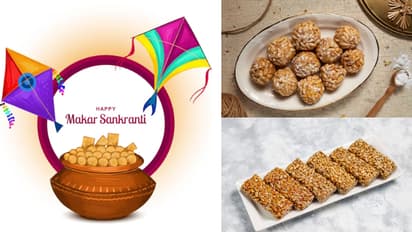
As the chill of winter sets in, our body’s nutritional needs change. The foods traditionally associated with Makar Sankranti, such as til (sesame), jaggery, khichdi, and gajak, are more than just festive treats; they are tailored to boost health and combat the harsh effects of the cold weather.
Sesame (Til) and Jaggery (Gur): A Nutritional Power Duo
The hallmark of Makar Sankranti is sesame and jaggery, featured prominently in sweets like til laddoos, chikkis, and gajak. These ingredients are not just symbolic but serve vital health functions during winter.
Boosting Immunity:
Sesame seeds are rich in calcium, magnesium, and iron, which support bone health and energy production. When combined with jaggery, rich in antioxidants and minerals such as zinc and selenium, these sweets enhance immunity and prevent common winter illnesses.
Providing Warmth:
Both sesame and jaggery are natural heat producers. Consuming these helps regulate body temperature, providing warmth and combating the cold weather.
Improving Digestion:
Jaggery is a natural digestive aid, helping cleanse the liver and stomach. Paired with the fibre content of sesame seeds, these sweets ensure a healthy digestive system during festive feasting.
Khichdi : The Ultimate Comfort Food
In many regions, Makar Sankranti is synonymous with eating khichdi—a wholesome dish made of rice, lentils, and sometimes seasonal vegetables. It is a simple yet powerful dish packed with nutrients.
Balanced Nutrition: The combination of rice and lentils provides all nine essential amino acids, making it a complete protein source. Adding vegetables, like carrots, peas, or spinach, enhances its vitamin and fibre content.
Easy Digestion: Warm, soft, and mildly spiced, khichdi is gentle on the stomach, making it ideal for the colder months when digestion tends to slow down.
Detoxifying Properties: Khichdi acts as a light detox meal, balancing the body's doshas (as per Ayurveda) and aiding in post-festival recovery.
Seasonal Vegetables: A Winter Gift
Makar Sankranti emphasises eating fresh seasonal produce, such as carrots, radishes, spinach, and mustard greens. These vegetables are nutrient powerhouses, loaded with vitamins A, C, and K, as well as antioxidants that enhance immunity.
Beta-Carotene Boost: Carrots are rich in beta-carotene, which promotes eye health and glowing skin—both vital during the dry winter months.
Iron and Folic Acid: Spinach and mustard greens are excellent sources of iron and folic acid, essential for combating winter fatigue and keeping energy levels up.
Dahi (Curd) and Chura (Flattened Rice): A Unique Tradition
People prepare a traditional dish of dahi-chura (curd with flattened rice) in parts of Bihar and eastern India. While it may seem surprising to consume curd in winter, it has a purpose.
Probiotics for Gut Health: Curd is rich in probiotics, essential for maintaining a healthy gut microbiome.
Energy Boost: Flattened rice, a source of complex carbohydrates, provides sustained energy, ideal for busy festival days.
• Cooling Balance: By combining jaggery with other rich winter foods, this dish maintains equilibrium by balancing body heat.
Makhan and Sakkarai Pongal in the South
Rice, moong dal, jaggery, and ghee combine to make sweet pongal, a staple for Makar Sankranti in South India. This dish has its own set of health benefits:
Rich in Good Fats: Ghee and jaggery provide warmth and energy, crucial for winter vitality.
Protein Punch: Moong dal is a fantastic source of plant-based protein, aiding muscle repair and boosting overall strength.
Ayurvedic Wisdom in Makar Sankranti Foods
Ayurveda recognises winter as a time when the body's digestive fire (agni) is at its peak. The foods associated with Makar Sankranti—rich in natural oils, proteins, and complex carbohydrates—align perfectly with this principle. They provide warmth, energy, and immunity while ensuring simple digestion.
A Festival of Health and Harmony
Makar Sankranti foods are a testament to India’s deep connection between tradition and wellness. These recipes, passed down through generations, are delicious and tailored to seasonal physical demands. As we indulge in these delicacies, let’s remember the wisdom they embody—nourishing both body and soul.
So, this Makar Sankranti, enjoy the festive flavours guilt-free, knowing they are designed to keep you warm, healthy, and strong through winter’s chill.